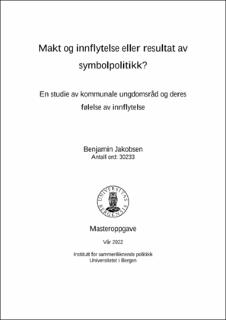| dc.contributor.author | Jakobsen, Benjamin | |
| dc.date.accessioned | 2022-08-10T23:49:55Z | |
| dc.date.available | 2022-08-10T23:49:55Z | |
| dc.date.issued | 2022-06-22 | |
| dc.date.submitted | 2022-08-09T22:00:08Z | |
| dc.identifier.uri | https://hdl.handle.net/11250/3011178 | |
| dc.description.abstract | Sammendrag I 2019 trådte store deler av den nye kommuneloven i kraft. Dette innebar blant annet at det ble lovpålagt for alle norske kommuner å ha et ungdomsråd, for å sikre unges medvirkning i saker som angår dem. I denne oppgaven skal jeg se nærmere på disse ungdomsrådene og deres følelse av innflytelse. Problemstillingene jeg vil ta for meg er: «Hvordan opplever ungdomsrådene selv sin egen innflytelse? Hva er det som gjør at enkelte ungdomsråd føler at de har liten innflytelse, til tross for at forholdene virker tilrettelagt for at de skal føle det motsatte?» For å best kunne besvare disse problemstillingene vil jeg ta utgangspunkt i maktbegrepet, teori på deltakelse og Sherry Arnstein sin Ladder of Citizen Participation. Jeg har valgt å benytte meg av flermetodedesign der kvantitativ og kvalitativ metode kombineres. Det kvantitative datagrunnlaget for oppgaven er samlet inn gjennom et standardisert digitalt spørreskjema som ble sendt ut til samtlige ungdomsråd i Norge sine 356 kommuner. Totalt fikk jeg 112 svar fra 105 unike kommuner. Det kvalitative datagrunnlaget ble samlet inn gjennom fire intervjuer med to valgte kommuner. To av intervjuene var med medlemmer av ungdomsråd og de to andre intervjuene var med ansatte som hadde ansvar for ungdomsråd. Hensikten med den kvantitative metoden er å kunne si noe generelt om hvordan det står til med ungdomsrådets følelse av innflytelse. Den kvalitative metoden har som hensikt å gi oss en dypere innsikt i hva som påvirker ungdomsråds innflytelse, og hva som gjør at noen ungdomsråd føler at de har liten innflytelse. Resultatene fra undersøkelsene viser at ungdomsrådene stort sett føler at de har noe eller stor innflytelse, og det er kun et mindretall som føler at de ikke har innflytelse i saker som angår unge. Av intervjuene kommer det frem at ungdomsrådsmedlemmene ser ut til å ha en noe annen forventning til sin innflytelse, enn det de ansatte med ansvar for ungdomsrådene har. Det pekes også på viktigheten av opplæring og at ungdomsrådene blir hørt og tatt på alvor. Institutt for Sammenliknende politikk ved Universitetet i Bergen Juni 2022 | |
| dc.description.abstract | Abstract In 2020, the new Local Government Act came to effect. This meant, among other things, that it was required by law for all Norwegian municipalities to have a youth council, to ensure young people's participation in matters concerning them. In this thesis, I have looked more closely at these youth councils and their sense of influence. The issues I want to address are: «How do the youth councils themselves experience their own influence? What is it that makes some youth councils feel that they have little influence, despite the fact that the conditions seem arranged for them to feel the opposite?» In order to best answer these questions, I will take a closer look at the concept of power, the theory of participation and Sherry Arnstein's Ladder of Citizen Participation. I have chosen to use multimethod design where quantitative and qualitative methods are combined. The quantitative data that is the basis for this thesis has been collected through a standardized digital questionnaire that was sent out to all youth councils in Norway's 356 municipalities. I received, in total, 112 answers from 105 unique municipalities. The qualitative data was collected through four interviews with two selected municipalities. Two of the interviews were with members of the youth council and the other two interviews were with employees who were responsible for the youth council. The purpose of the quantitative method is to be able to say something in general about how the youth council's sense of influence is. The qualitative method aims to give us a deeper insight into what influences youth councils' influence, and what makes some youth councils feel that they have little influence. The results from the surveys show that the youth councils generally feel that they have some or great influence, and only a minority feel that they have no influence in matters concerning young people. The interviews show that the youth council members seem to have a somewhat different expectation of their influence than the employees with responsibility for the youth councils have. It is also pointed at the importance of education and that the youth councils are heard and taken seriously. Department of Comparative Politics at the University of Bergen June 2022 | |
| dc.language.iso | nob | |
| dc.publisher | The University of Bergen | |
| dc.rights | Copyright the Author. All rights reserved | |
| dc.subject | deltakelse | |
| dc.subject | innflytelse | |
| dc.subject | makt | |
| dc.subject | Ungdomsråd | |
| dc.title | Makt og innflytelse eller resultat av symbolpolitikk? En studie av kommunale ungdomsråd og deres følelse av innflytelse | |
| dc.title.alternative | Power and influence or the result of symbolic politics? A study of municipal youth councils and their feeling of influence | |
| dc.type | Master thesis | |
| dc.date.updated | 2022-08-09T22:00:08Z | |
| dc.rights.holder | Copyright the Author. All rights reserved | |
| dc.description.degree | Masteroppgave | |
| dc.description.localcode | SAMPOL350 | |
| dc.description.localcode | MASV-SAPO | |
| dc.subject.nus | 731114 | |
| fs.subjectcode | SAMPOL350 | |
| fs.unitcode | 15-13-0 | |
